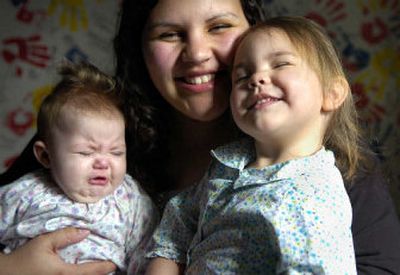Early Head Start site may close

A child development program that serves low-income families and some of Spokane’s most troubled teen moms may be forced to close its downtown location due to cuts in federal funding.
Faced with a nearly $80,000 decrease in annual federal funding, the Community Colleges of Spokane is considering closing the Early Head Start program housed at Crosswalk, a center for homeless and high-risk youth.
“This center serves kids who just fall through every crack in our culture,” said Kent Hoffman, a Spokane psychotherapist. “When these moms get pregnant we have a place for them to go; they have a safe place to take their babies.”
Early Head Start provides early childhood education to low-income infants and toddlers to age 3. The program takes 16 children in three-hour blocks, four days a week. It’s a component of Head Start, which serves children 3 to 5. Both programs are operated by the Community Colleges in 11 locations throughout Spokane and are free to qualifying families. Crosswalk is operated by the Volunteers of America or VOA.
Under the proposed cuts, the Early Head Start program at Crosswalk would be relocated and absorbed into a Head Start program at the East Central Community Center.
That would save about $35,000 a year, said Kris Miller, the district director for Head Start programs at the Community Colleges, which is also a part of the Institute for Extended Learning. Other programs would also face changes to make up for the loss in federal money.
No staff positions would be eliminated. The teachers at the Crosswalk Early Head Start would move to the community center.
“It won’t reduce the number of kids served; we will still serve 16 low-income infants and toddlers,” Miller said. “But it probably won’t be the same 16 that are served at the Crosswalk location.”
At Crosswalk, the child development program is upstairs from the shelter, where street kids and other troubled youth ages 13 to 17 get services that include school, food, medical assistance, counseling and clothing.
“This program has such a huge success rate,” said Kari Garza, the mother of two children in the Early Head Start program at Crosswalk.
With help from services provided through the VOA, Garza is now able to attend college full time. Access to free child care has allowed her to stay in school.
“The kids that use Crosswalk are here because they want to do better,” Garza said. “I just don’t understand why they would want to mess with that.”
Most of the teen moms bring their babies into Early Head Start during school hours, when they need to focus on studies. Moving the center means cutting out the teens living on the streets downtown because of transportation barriers, Crosswalk officials said.
“You have to go to where the kids are, that is the nature of street culture,” Hoffman said. “Moving to the East Central center just isn’t going to work.”
But the colleges have little choice.
Federal funding for programs like Head Start has been on a slow but steady decline for a couple of years. Last year, the government spent $6.8 million on Head Start. In 2006 that appropriation will be $6.7 million.
“In years past we had annual increases of 3 percent, and that started declining two years ago to about 1.6 percent,” Miller said. It wasn’t until this year that the funding was decreased.
Even when the federal contribution increased, it typically wasn’t enough to cover increasing costs, Miller said.
“It’s things like contract negotiations that raised staff salaries, and of course every year the cost of benefits goes up,” Miller said.
The Early Head Start at the downtown Spokane teen center will likely have to close in June unless more private or community donations come in. The program does not operate in the summer.
“Communities need to invest in the education of children of the youngest ages. It’s the only way to stop the cycle of poverty,” said Hoffman, who has volunteered at Crosswalk for more than 10 years.
“It’s not until (the babies) end up adolescents that the effects will be felt.”